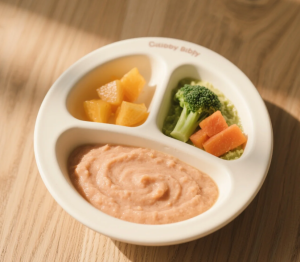
🍵 Introduction: You Are What Your Baby Eats
Breastfeeding is often described as one of the most intimate and impactful experiences in motherhood. But beyond the bonding, comfort, and convenience, there’s a fascinating science at play: what you eat as a mom directly affects the quality, composition, and benefits of your breast milk.
This article dives deep into the complex relationship between maternal nutrition and infant health. Whether you’re exclusively breastfeeding, mixed feeding, or just curious about how diet affects lactation, you’ll leave with clarity, confidence, and a grocery list worth its weight in gold.
🧵 Understanding Breast Milk Composition
Breast milk isn’t just food—it’s dynamic, living nutrition. It adapts to your baby’s needs, offering hydration, calories, immune protection, and even mood-regulating hormones. But where do these components come from? Yep, your body builds them based on what you eat.
Key components influenced by maternal diet:
- Fats: The types of fats in your milk reflect what you consume. Omega-3 fatty acids (especially DHA) are vital for your baby’s brain and eye development.
- Vitamins: Water-soluble vitamins like B-complex and vitamin C vary with your diet. If your intake is low, your milk may be too.
- Micronutrients: Iodine, selenium, and zinc levels in breast milk depend on maternal intake.
- Antioxidants: Diets rich in colorful fruits and vegetables help pack your milk with cell-protecting nutrients.
🌿 Best Foods for Nursing Moms
Forget eating for two—it’s more like eating smart for one and nourishing for two. Here are powerhouse foods to include in your daily meals:
- Salmon (or sardines): Rich in DHA and protein
- Leafy greens: Spinach, kale, and Swiss chard for calcium and folate
- Oats: Iron-rich and believed to support milk supply
- Nuts and seeds: Healthy fats and essential minerals like magnesium
- Eggs: Excellent source of protein and choline (important for brain development)
- Greek yogurt: Packed with calcium and probiotics
- Sweet potatoes: Beta-carotene for immune support
- Lentils and beans: Plant-based protein and fiber

🧲 Hydration: More Than Just Water
Milk is around 87% water, so your hydration level directly affects how much milk you make. But don’t obsess over gulping gallons.
Tips to stay hydrated:
- Drink to thirst: Your body is a reliable indicator.
- Have a water bottle nearby during feeds
- Include hydrating foods like cucumber, watermelon, and broth-based soups
- Limit caffeine and sugary drinks that may dehydrate
Bonus tip: Herbal teas like fenugreek and fennel may support lactation—but consult your doctor before adding them.
🍎 Foods to Avoid or Limit
While there’s no universal “do not eat” list, some foods can affect your baby’s comfort or your milk quality.
Consider reducing or avoiding:
- High-mercury fish: Like swordfish or king mackerel
- Excessive caffeine: Can make baby fussy or affect sleep
- Alcohol: If you drink, wait 2-3 hours before nursing
- Strong flavors: Some spicy or garlicky foods may alter milk taste
- Highly processed foods: These may reduce nutrient density in your milk
🫵 Common Myths About Breastfeeding Diets
Let’s bust some of the most stubborn myths:
- “You must drink milk to make milk”: Not true. Calcium can come from many sources.
- “Certain foods always increase milk supply”: Oats and fenugreek may help, but not for everyone.
- “Spicy food will harm the baby”: Most babies handle flavors just fine—in fact, early exposure may help them accept diverse tastes later.
- “Vegan or vegetarian moms can’t breastfeed well”: Totally false, as long as you plan a nutrient-rich diet and supplement appropriately (e.g., B12).
🌱 Supplements: Do You Need Them?
Even with the best diet, some nutrients are tough to get in adequate amounts. Here are supplements that many lactating moms benefit from:
- Vitamin D: Breast milk is often low in this crucial vitamin. Supplementing yourself (or baby) is common.
- Omega-3 (DHA): For brain and eye health
- Vitamin B12: Especially important for vegan moms
- Iron: If you’re anemic or had blood loss during birth
- Iodine: For thyroid and brain development

Before taking any supplement, consult a healthcare provider for the right dosage and type.
🚪 Special Diets and Breastfeeding
- Vegetarian/Vegan: Make sure to include B12, calcium, iron, and omega-3s from plant sources.
- Gluten-Free: Be cautious of hidden gluten in sauces and processed snacks.
- Low-Carb/Keto: May impact milk supply in some women. Discuss with a nutritionist.
Your milk adapts, but you still need to fuel your body with balance and variety.
💼 Real Talk: Eating Well With Zero Time
Let’s be honest: cooking gourmet meals while nursing around the clock? Unlikely.
Quick nutrition hacks:
- Prep smoothie bags with frozen fruits, greens, and seeds
- Snack baskets with nuts, protein bars, and dried fruit
- Sheet pan meals: throw protein + veggies on a tray, bake
- One-handed snacks: apples + nut butter, hummus + carrots
- Overnight oats: minimal effort, max nutrition
You don’t need perfection—just consistency.
🥞 Sample Daily Meal Plan for Breastfeeding Moms
Breakfast: Overnight oats with chia seeds, almond milk, berries
Snack: Boiled egg and a banana
Lunch: Quinoa salad with spinach, chickpeas, avocado, lemon-tahini dressing
Snack: Greek yogurt with honey and almonds
Dinner: Baked salmon, sweet potato mash, steamed broccoli
Evening snack: Herbal tea and whole grain toast with peanut butter
Remember, feeding your baby is an act of love—so is feeding yourself. Whether it’s salmon, sweet potatoes, or yesterday’s cold leftovers eaten with one hand, every bite matters. You got this, mama.








